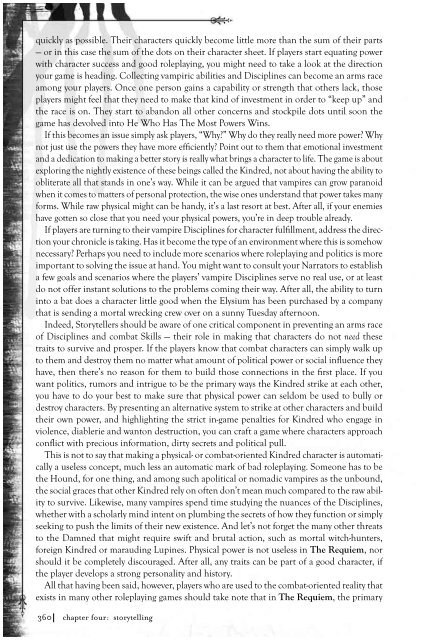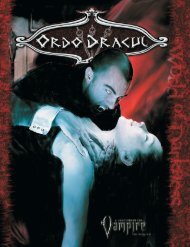Mind's Eye Theatre - Vampire The Requiem.pdf - RoseRed
Mind's Eye Theatre - Vampire The Requiem.pdf - RoseRed
Mind's Eye Theatre - Vampire The Requiem.pdf - RoseRed
You also want an ePaper? Increase the reach of your titles
YUMPU automatically turns print PDFs into web optimized ePapers that Google loves.
quickly as possible. <strong>The</strong>ir characters quickly become little more than the sum of their parts<br />
— or in this case the sum of the dots on their character sheet. If players start equating power<br />
with character success and good roleplaying, you might need to take a look at the direction<br />
your game is heading. Collecting vampiric abilities and Disciplines can become an arms race<br />
among your players. Once one person gains a capability or strength that others lack, those<br />
players might feel that they need to make that kind of investment in order to “keep up” and<br />
the race is on. <strong>The</strong>y start to abandon all other concerns and stockpile dots until soon the<br />
game has devolved into He Who Has <strong>The</strong> Most Powers Wins.<br />
If this becomes an issue simply ask players, “Why?” Why do they really need more power? Why<br />
not just use the powers they have more effi ciently? Point out to them that emotional investment<br />
and a dedication to making a better story is really what brings a character to life. <strong>The</strong> game is about<br />
exploring the nightly existence of these beings called the Kindred, not about having the ability to<br />
obliterate all that stands in one’s way. While it can be argued that vampires can grow paranoid<br />
when it comes to matters of personal protection, the wise ones understand that power takes many<br />
forms. While raw physical might can be handy, it’s a last resort at best. After all, if your enemies<br />
have gotten so close that you need your physical powers, you’re in deep trouble already.<br />
If players are turning to their vampire Disciplines for character fulfi llment, address the direction<br />
your chronicle is taking. Has it become the type of an environment where this is somehow<br />
necessary? Perhaps you need to include more scenarios where roleplaying and politics is more<br />
important to solving the issue at hand. You might want to consult your Narrators to establish<br />
a few goals and scenarios where the players’ vampire Disciplines serve no real use, or at least<br />
do not offer instant solutions to the problems coming their way. After all, the ability to turn<br />
into a bat does a character little good when the Elysium has been purchased by a company<br />
that is sending a mortal wrecking crew over on a sunny Tuesday afternoon.<br />
Indeed, Storytellers should be aware of one critical component in preventing an arms race<br />
of Disciplines and combat Skills — their role in making that characters do not need these<br />
traits to survive and prosper. If the players know that combat characters can simply walk up<br />
to them and destroy them no matter what amount of political power or social infl uence they<br />
have, then there’s no reason for them to build those connections in the fi rst place. If you<br />
want politics, rumors and intrigue to be the primary ways the Kindred strike at each other,<br />
you have to do your best to make sure that physical power can seldom be used to bully or<br />
destroy characters. By presenting an alternative system to strike at other characters and build<br />
their own power, and highlighting the strict in-game penalties for Kindred who engage in<br />
violence, diablerie and wanton destruction, you can craft a game where characters approach<br />
confl ict with precious information, dirty secrets and political pull.<br />
This is not to say that making a physical- or combat-oriented Kindred character is automatically<br />
a useless concept, much less an automatic mark of bad roleplaying. Someone has to be<br />
the Hound, for one thing, and among such apolitical or nomadic vampires as the unbound,<br />
the social graces that other Kindred rely on often don’t mean much compared to the raw ability<br />
to survive. Likewise, many vampires spend time studying the nuances of the Disciplines,<br />
whether with a scholarly mind intent on plumbing the secrets of how they function or simply<br />
seeking to push the limits of their new existence. And let’s not forget the many other threats<br />
to the Damned that might require swift and brutal action, such as mortal witch-hunters,<br />
foreign Kindred or marauding Lupines. Physical power is not useless in <strong>The</strong> <strong>Requiem</strong>, nor<br />
should it be completely discouraged. After all, any traits can be part of a good character, if<br />
the player develops a strong personality and history.<br />
All that having been said, however, players who are used to the combat-oriented reality that<br />
exists in many other roleplaying games should take note that in <strong>The</strong> <strong>Requiem</strong>, the primary<br />
360<br />
mind’s chapter eye four: theatre: storytelling requiem



